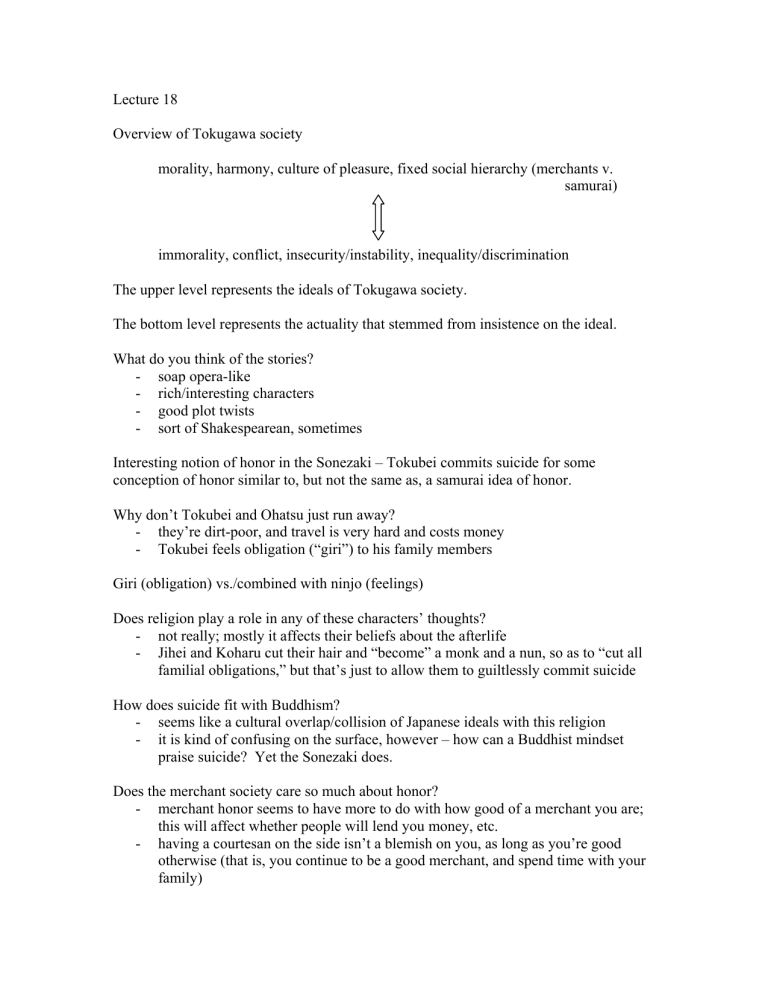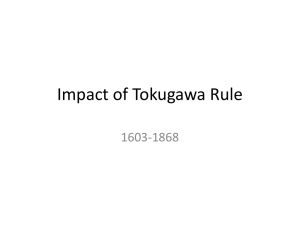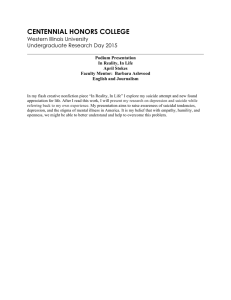Lecture 18 Overview of Tokugawa society

Lecture 1 8
Overview of Tokugawa society morality, harmony, culture of pleasure, fixed social hierarchy (merchants v. samurai) immorality, conflict, insecurity/instability, inequality/discrimination
The upper level represents the ideals of Tokugawa society.
The bottom level represents the actuality that stemmed from insistence on the ideal.
What do you think of the stories?
soap opera-like
rich/interesting characters
good plot twists
sort of Shakespearean, sometimes
Interesting notion of honor in the Sonezaki – Tokubei commits suicide for some conception of honor similar to, but not the same as, a samurai idea of honor.
Why don’t Tokubei and Ohatsu just run away?
they’re dirt-poor, and travel is very hard and costs money
Tokubei feels obligation (“giri”) to his family members
Giri (obligation) vs./combined with ninjo (feelings)
Does religion play a role in any of these characters’ thoughts?
not really; mostly it affects their beliefs about the afterlife
Jihei and Koharu cut their hair and “become” a monk and a nun, so as to “cut all familial obligations,” but that’s just to allow them to guiltlessly commit suicide
How does suicide fit with Buddhism?
seems like a cultural overlap/collision of Japanese ideals with this religion
it is kind of confusing on the surface, however – how can a Buddhist mindset praise suicide? Yet the Sonezaki does.
Does the merchant society care so much about honor?
merchant honor seems to have more to do with how good of a merchant you are; this will affect whether people will lend you money, etc.
having a courtesan on the side isn’t a blemish on you, as long as you’re good otherwise (that is, you continue to be a good merchant, and spend time with your family)
Strange relationship between Osan and Koharu – what’s going on here?
Koharu agreed to give up her love for Jihei, and now Jihei’s forced her into the position of being redeemed by a man she detests, so Osan wanted to help her because she’s in this position only because she made good on her agreement to give up Jihei
Does Koharu do anything for her in return?
Koharu had vowed to keep Jihei from coming to harm, and she sort of tries to stop him from killing himself, but in the end she allows him to do it.
What do the merchants think of samurai?
they don’t find them intimidating
don’t respect them very much (for example, think of what Jihei’s brother says to him about having to dress up like a samurai; he feels like a clown)
“Redeeming” a courtesan does not mean she’s free. She belongs then to the person who redeemed her.
Note that it’s Tahei’s purchasing of Koharu that incites the lovers to finally run off together, after all these years.
[finished Double Suicide ]





